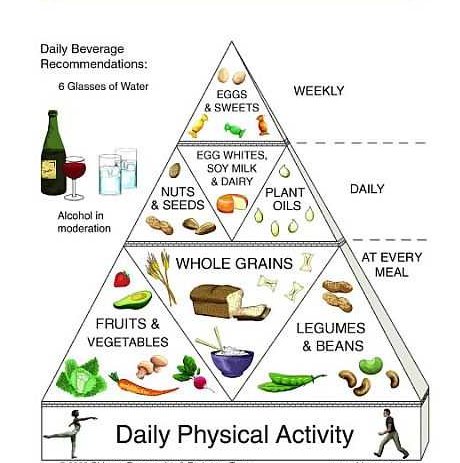
The basics of achieving and maintaining a healthy weight are the same for everyone:
Eat a healthy diet and balance calories eaten with calories burned. Vegetarians like non-vegetarians can make poor food choices that contribute to weight gain, such as large portions of high-fat, high-calorie foods or foods with little or no nutritional value.
Why Do People Become Vegetarians?
For much of the world, vegetarianism is largely a matter of economics: Meat costs a lot more than, say, beans or rice, so meat becomes a special-occasion dish (if it's eaten at all). Even where meat is more plentiful, it's still used in moderation, often providing a side note to a meal rather than taking center stage.
In countries like the United States where meat is not as expensive, though, people choose to be vegetarians for reasons other than cost. Parental preferences, religious or other beliefs, and health issues are among the most common reasons for choosing to be a vegetarian. Many people choose a vegetarian diet out of concern over animal rights or the environment. And lots of people have more than one reason for choosing vegetarianism.
For this reason, vegetarian diets should be as carefully planned as nonvegetarian diets to make sure they are nutritionally balanced. Choose a vegetarian eating plan that is low in fat and that provides all of the nutrients your body needs. Be sure to include protein-rich foods — especially if you follow a vegetarian diet that limits fish, eggs and dairy products. Not only is protein an essential nutrient, but also it helps you feel full longer which can curb your urge to snack.
But be cautious about your protein sources. Substituting large quantities of full-fat cheese and peanut butter for meat will add a significant amount of fat and calories to your diet. Limit your portions of these high-fat proteins. Opt for low-fat protein sources, such as dried beans, low-fat cheese, reduced-fat peanut butter and soy products.
Cooking methods and condiments also factor into your calorie intake. Instead of frying, try steaming, boiling, grilling or roasting foods. If you stir-fry, reduce the amount of oil you use. Also, use smaller amounts or lower fat versions of sour cream, mayonnaise, cheese and salad dressing in your food preparation.
Types of vegetarian diets
When people think about a vegetarian diet, they typically think about a diet that doesn't include meat, poultry or fish. But vegetarian diets can be further categorized into three types:
- Vegan diets exclude meat, poultry, fish, eggs and dairy products — and foods that contain these products.
- Lacto-vegetarian diets exclude meat, fish, poultry and eggs, as well as foods that contain them. Dairy products, such as milk, cheese, yogurt and butter, are allowed in a lacto-vegetarian diet.
- Lacto-ovo vegetarian diets exclude meat, fish and poultry, but allow eggs and dairy products.
Some people follow a semivegetarian diet — also called a flexitarian diet — which is primarily a plant-based diet but includes meat, dairy, eggs, poultry and fish on occasion or in small quantities.
Vegetarian Food Pyramid
A vegetarian diet can be very healthy, but it is not inherently so. Just cutting meat out of your meals does not automatically assure you all the benefits of the vegetarian diet - in order to be healthy, you need to eat healthy food, vegetarian or not.
The first and most important characteristic of a healthy vegetarian or other type of diet is a wide variety of food. Eating lots of different foods ensures that you get the nutrition you need and that no single food serves as your sole source of a given nutrient. In addition, eating too much of a single food can cause your body to develop sensitivity to that food, which can eventually lead to an allergy.

The vegetarian food pyramid
Legumes: 2 or more servings per day
group includes beans, peas, lentils, tempeh, tofu, & meat/dairy substitutes. source of fiber, protein, iron, calcium, zinc, and B vitamins.
Vegetables: 3 or more servings per day
group includes broccoli, collards, kale, carrots, & sweet potatoes. source of vitamin C, beta-carotene, riboflavin, iron, calcium, & fiber.
Fruit: 3 or more servings per day
group includes citrus fruits, melons, berries, bananas & apples. source of fiber, vitamin C, and beta-carotene.
Whole Grains: 6-11 servings per day
group includes bread, rice, pasta, hot or cold cereal, corn, millet, barley, bulgur, buckwheat, oats, and tortillas. source of fiber, complex carbohydrates, protein, B vitamins and zinc.
Vitamin B12
Vitamin B12 is produced by bacteria commonly found in the bodies of animals. Vegetables are not reliable sources of B12. Vegetarians should include reliable sources of B12 in their diet by consuming a multi-vitamin, a B12 supplement, or foods fortified with B12.
Omega 3 Fatty Acids
Most people consume too much fat, but few people get enough of the healthy Omega-3 fatty acids. These essential fats can be found in walnuts, canola oil, and flax seeds. For maximum absorbtion, flax seeds should be ground up in a blender or coffee grinder, then added to smoothies or sprinkled on top of other foods. Flax seeds are also rich in protein, potassium, magnesium, boron, and lignans, which may help prevent cancer.
Vitamin D and Calcium
Vitamin D and calcium are important in bone formation. Vitamin D can be obtained from sunlight exposure. Vegans who get little sunlight, or those who live at high latitudes, should take a vitamin D supplement,or consume fortified soymilk or rice milk. Vegans should also get 3 servings of high calcium foods each day, such as kale, broccoli, collard greens, and fortified soymilk & orange juice.
![]()
Disclaimer: This website is for information purposes only. By providing the information contained herein we are not diagnosing, treating, curing, mitigating, or preventing any type of disease or medical condition. Before beginning any type of natural, integrative or conventional treatment regime, it is advisible to seek the advice of a licensed healthcare professional.



























